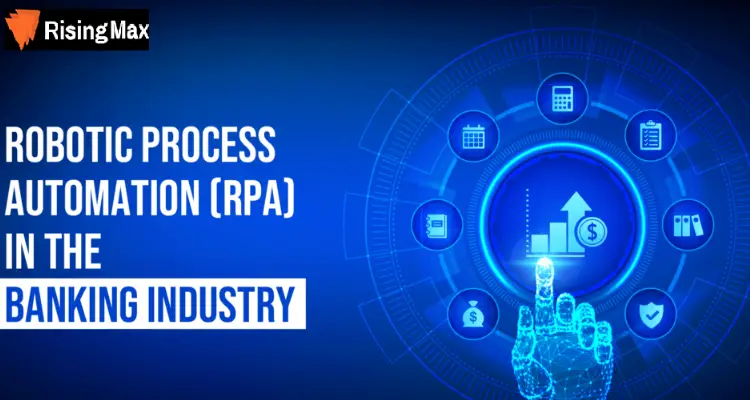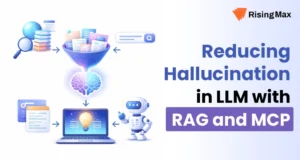Technology developments in recent years have greatly improved banking and financial services’ speed, security, and dependability. RPA, or robotic process automation, significantly factors into this shift. Numerous banking firms have implemented RPA solutions to maintain a competitive edge and improve the user experience.
RPA hopes to improve efficiency, reduce human error, and simplify banking and finance operations by automating routine tasks. Speeding up several processes and reducing the likelihood of human error makes the industry more dependable.

There are numerous RPA use cases in banking. In this blog, you will learn the benefits of implementing RPA in banking and its top use cases.
For a free consultation, you can get in touch with us. RisingMax Inc. is the leading RPA software development company. We have 150+ developers with years of experience.What is RPA in Banking?
Robotic process automation (RPA) can help the banking industry with account opening, the Know Your Customer (KYC) process, customer service, and many other tasks that need to be done repeatedly. RPA assists banks and accounting divisions in automating repetitive manual processes, allowing staff to concentrate on more important activities and giving the company a competitive edge.
By using RPA in their operations, banking companies can be sure that costs will go down and processes will be carried out quickly and correctly. It is thought that RPA will be worth $1.12 billion to the banking industry by 2025. Using AI technology and RPA, the banking industry can also automate making difficult decisions, like stopping money laundering and finding fraud. On the operational side, banks may even seek additional efficiency alongside RPA, by leveraging, for instance, powerful merchant management features to further improve transaction oversight.
Top Use Cases Of RPA In Banking
RPA Use Cases For Financial Products
1. Loan Processing
Loan processing ranks high among all the arduous and time-consuming procedures in the banking industry. RPA can complete a process normally taking months in as little as 10 to 15 minutes. Automation helps us extract the necessary information from the customer’s submitted documents and check every detail. Simpler statistical methods support machine learning in making better data-driven decisions. Intermediary bots can prompt users to correct any incorrect entries and make safer loan decisions by generating automated confirmation letters and utilizing business logic.
2. Credit Card Processing
Even though the widespread digitization of financial services has sped it up, humans still need to intervene in the credit card application process. RPA bots typically independently approve credit card applications, greatly expediting the process and boosting customer satisfaction. A robotic process automation (RPA) bot validates an applicant’s identity, checks their background, and then either approves or rejects them or, in extremely unusual circumstances, sends them to a human employee.
3. Mortgage Loan
In the United States, it usually takes a couple of days, sometimes months, to process a mortgage loan. Various checks, such as credit checks, repayment history, employment verification, and inspection, are conducted when approving a mortgage loan. A minor error can slow the process down. RPA can accelerate the process and clear the bottleneck to reduce the processing time to minutes from days because it is based on a specific set of rules and checks.
4. Trade Finance
Many international entities collaborate to facilitate the transfer of goods and money in a trade finance transaction. Banks and businesses use processed documents like letters of credit (LCs), bank guarantees (BGs), and others to facilitate communication.
Case study vendors claim they can automate a trade finance application without writing a comprehensive ruleset. They trained the cognitive automation tool by depending on process workers instead.
RPA Use Cases For Customer Service in Banks
1. Account Opening And Customer Onboarding
Banks face an avalanche of regulatory requirements when they take on new customers. Bank staff collect customers’ personal and financial information, verify it through recognized government agencies, create an account, and establish data archiving and monitoring procedures. By automating most tasks, an RPA system can drastically reduce operational costs, risks, and new client onboarding time.
2. Automation of Salary
Handling payable accounts manually takes time as staff members must digitize vendor invoices, check all the information, and then process the payment. This task can be replaced by RPA. RPA software with optical character recognition (OCR) add-ons enables automated data capture and re-entry, including audit trail functionality.
3. KYC
For any type of loan or account-related service request, banks have a set and mandatory KYC- Know Your Customer or Know Your Client process. Up to a certain level, the KYC process will assist in locating and validating consumers’ authentication for simple financial transactions online.
For banks, manually collecting customer information and filling out KYC documents is a difficult operation. RPA-enabled digital sophisticated software applications will automate KYC processes and carry out operations without revealing private information.
4. Same-Day Funds Transfers
The recipient can withdraw or transfer “same-day funds” from their bank account on the same business day the funds are deposited.
One British bank used CHAPS, an automated payment system that allows for same-day transfers of funds, to finish its daily payments. The RPA bots automated the manual process, reducing the time per request from 10 minutes to a few seconds.
5. Responding to Customer Requests
Conversational AI can be incorporated into robotic process automation bots. AI-powered chatbots, often called conversational AI systems, can automate the fulfillment of client requests. Additionally, chatbots notify customers to clarify any unclear customer requests.
Revolutionizing BankingWith Robotic Process Automation Software Solutions
Transform your workflows with RPA excellence. Take the first step towards streamlined operations – click to schedule a consultation.
RAP Uses Cases For Audit & Compliance In Banking
1. Audits
Bankers can use robotic automation to conduct thorough audit trails for all processes and generate audit reports, which can lower business risk. A client’s record can be reviewed by automation, and reports can be produced in Word documents in a matter of minutes.
2. Fraud Detection
Frauds are one of the major problems in the banking sector. Whether from cyber frauds or by businessmen, frauds impact the economy very badly. The RPA in banking will omit the chances of fraud with the bank’s and clients’ money.
Let’s understand this with an example if any cyber fraud tries to get unauthorized access to the bank detail, the robotic process automation in banking will eject them from the platform directly and will, send notifications to the bank and will alert the police with details of the server used for doing the unfair means.
3. Anti-Money Laundering (AML)
RPA can make one of the most data-intensive processes, AML, much easier. RPA saves time and money compared to labor-intensive traditional banking solutions, whether it automates manual processes or detects suspicious financial transactions.
4. Regulatory Monitoring
RPA can scan regulatory policy announcements for future changes. Users can either catch changes early or access the latest updates as they are released in real-time. New regulations may take some time because authorities implement them smoothly and consistently. RPA allows you to compare notifications side by side to see improvements. The decrease in the possibility of noncompliance fines caused by manual oversight errors reduces the time spent identifying regulations.
One US bank used RPA to streamline its anti-money laundering procedures, which included checking in with prospects, reviewing clients regularly, and keeping tabs on subjects who might be engaging in suspicious activity. The execution of the automation project resulted in the RPA bot increasing regulatory compliance and reducing present due diligence expenses by 75%.
Other Use Cases Of RPA In Banking
Report Generation
Numerous reporting chores, such as monthly closing, reconciliations, and management reports, can be automated with financial RPA.Compliance regulations require banks and financial institutions to create reports outlining their performance and difficulties and deliver them to the board of directors.
These documents contain an enormous amount of data, making it a time-consuming and error-prone effort for people to create them. On the other hand, robotics in banking and finance can efficiently compile data from many sources, present it clearly, and produce error-free reports.
The sectors are getting better with the banking robotic process automation, creating a new and better world of the financial sectors.
Streaming Sales Processes
One of the important RPA use cases in the banking and finance sector is this one. Android, iPhone, and Web applications that support RPA will be crucial in optimizing sales processes.
Applications based on robotic process automation (RPA) will automatically analyze emails, classify language, decipher business or customer demands, identify the potential of leads, and allocate the lead to the appropriate agent to close.
By forcing executives to respond promptly to customer or business client needs, this automated method modernizes sales tactics and ensures that no single prospect ever runs out of steam.

How Implementing RPA Can Improve Customer Service In Banking
Numerous intelligence tools are used in robotic process automation (RPA) to automate repetitive operations. One sector that stands to benefit greatly from automation is customer service, and RPA provides solutions to many issues. RPA facilitates an integrated, rapid, and enjoyable customer journey in contact centers by accelerating and optimizing procedures.
Software robots may now accomplish jobs that formerly required human contact by being educated to conduct rules-based functions, much like a person would. RPA is a consumer-facing tool as well as a back-office technology in the context of customer support.
Automating some of the tedious first-line support chores is possible, giving agents and salespeople more time to concentrate on providing real value to their clients.
Benefits of RPA In Banking
Implementing the RPA in banking will resolve the multiple challenges of the banking and financial sector. Here we will learn the benefits of banking robotic process automation.
- It will omit the possibility of cyber fraud and send alerts to the banks if such action is happening.
- The time consumption will reduce by up to 60-70%. The robotic automation process is applicable to all sorts of banking procedures, from opening bank accounts to settling loans.
- This will reduce human engagement in the banking procedures so that the manpower can get indulge in other important things.
- Due to its UI automation capabilities, RPA has the advantage of not requiring any significant infrastructure upgrades in the financial services industry. In the case of cloud-based RPA, the cost of hardware and maintenance is significantly decreased.
For implementing the RPA in banking sectors, you can get in touch with RisingMax Inc. We are the leading software development company with 13+ years of experience and a team of 150+ developers. Get cost-effective rates for robotic process automation development.Conclusion
Take the lead and adopt the trendiest technology in the banking and financial sector. The technology will enhance the user experience of your client as well as the employees and will help the company to grow with less effort on manual working.














